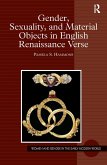Ashgate Critical Essays on Women Writers in England, 1550-1700
Volume 3: Anne Lock, Isabella Whitney and Aemilia Lanyer
Herausgeber: White, Micheline
Ashgate Critical Essays on Women Writers in England, 1550-1700
Volume 3: Anne Lock, Isabella Whitney and Aemilia Lanyer
Herausgeber: White, Micheline
- Gebundenes Buch
- Merkliste
- Auf die Merkliste
- Bewerten Bewerten
- Teilen
- Produkt teilen
- Produkterinnerung
- Produkterinnerung
Anne Lock, Isabella Whitney and Aemilia Lanyer are important literary figures. This book collects essays that elucidate these women's works from a wide range of feminist, literary, aesthetic, economic, racial, sexual and theological perspectives.
Andere Kunden interessierten sich auch für
![Aemilia Lanyer as Shakespeare's Co-Author Aemilia Lanyer as Shakespeare's Co-Author]() Mark BradbeerAemilia Lanyer as Shakespeare's Co-Author42,99 €
Mark BradbeerAemilia Lanyer as Shakespeare's Co-Author42,99 €![Information, Institutions, and Local Government in England, 1550-1700 Information, Institutions, and Local Government in England, 1550-1700]() Paul Griffiths (Professor of Early Modern British Cultural and SociInformation, Institutions, and Local Government in England, 1550-1700161,99 €
Paul Griffiths (Professor of Early Modern British Cultural and SociInformation, Institutions, and Local Government in England, 1550-1700161,99 €![Gender, Sexuality, and Material Objects in English Renaissance Verse Gender, Sexuality, and Material Objects in English Renaissance Verse]() Pamela S. HammonsGender, Sexuality, and Material Objects in English Renaissance Verse195,99 €
Pamela S. HammonsGender, Sexuality, and Material Objects in English Renaissance Verse195,99 €![Women Writers in Renaissance England Women Writers in Renaissance England]() Randall MartinWomen Writers in Renaissance England40,99 €
Randall MartinWomen Writers in Renaissance England40,99 €![Gender, Sexuality, and Material Objects in English Renaissance Verse Gender, Sexuality, and Material Objects in English Renaissance Verse]() Pamela S. HammonsGender, Sexuality, and Material Objects in English Renaissance Verse38,99 €
Pamela S. HammonsGender, Sexuality, and Material Objects in English Renaissance Verse38,99 €![Women, Space and Utopia 1600-1800 Women, Space and Utopia 1600-1800]() Nicole PohlWomen, Space and Utopia 1600-1800201,99 €
Nicole PohlWomen, Space and Utopia 1600-1800201,99 €![Sound, Space and Civility in the British World, 1700-1850 Sound, Space and Civility in the British World, 1700-1850]() Sound, Space and Civility in the British World, 1700-185061,99 €
Sound, Space and Civility in the British World, 1700-185061,99 €-
-
-
Anne Lock, Isabella Whitney and Aemilia Lanyer are important literary figures. This book collects essays that elucidate these women's works from a wide range of feminist, literary, aesthetic, economic, racial, sexual and theological perspectives.
Hinweis: Dieser Artikel kann nur an eine deutsche Lieferadresse ausgeliefert werden.
Hinweis: Dieser Artikel kann nur an eine deutsche Lieferadresse ausgeliefert werden.
Produktdetails
- Produktdetails
- Ashgate Critical Essays on Women Writers in England, 1550-1700
- Verlag: Taylor & Francis Ltd
- Seitenzahl: 506
- Erscheinungstermin: 28. Juni 2009
- Englisch
- Abmessung: 182mm x 256mm x 35mm
- Gewicht: 1034g
- ISBN-13: 9780754660866
- ISBN-10: 0754660869
- Artikelnr.: 54581433
- Herstellerkennzeichnung
- Libri GmbH
- Europaallee 1
- 36244 Bad Hersfeld
- gpsr@libri.de
- Ashgate Critical Essays on Women Writers in England, 1550-1700
- Verlag: Taylor & Francis Ltd
- Seitenzahl: 506
- Erscheinungstermin: 28. Juni 2009
- Englisch
- Abmessung: 182mm x 256mm x 35mm
- Gewicht: 1034g
- ISBN-13: 9780754660866
- ISBN-10: 0754660869
- Artikelnr.: 54581433
- Herstellerkennzeichnung
- Libri GmbH
- Europaallee 1
- 36244 Bad Hersfeld
- gpsr@libri.de
Micheline White, Associate Professor of English, Carleton University, Canada
Contents: Introduction; Bibliography; Part I Anne Locke Prowse: 'In a
mirrour clere': Protestantism and politics in Anne Lok's Miserere Mei Deus,
Rosalind Smith; Anne Lock's Meditation: invention versus dilation and the
founding of Puritan poetics, Roland Greene; 'An Englishe box': Calvinism
and commodities in Anne Lok's A Meditation of a Penitent Sinner,
Christopher Warley; Curing the soul: Anne Lock's authorial medicine, Susan
M. Felch. Part II Isabella Whitney: Oppositional ideologies of gender in
Isabella Whitney's Copy of a Letter, Paul A. Marquis; Literary property and
the single woman in Isabella Whitney's A Sweet Nosgay, Laurie Ellinghausen;
The maids lawful liberty: service, the household, and 'Mother B' in
Isabella Whitney's A Sweet Nosgay, Patricia Phillippy; Isabella Whitney and
the female legacy, Wendy Wall. Part III Aemilia Lanyer: Lanyer and Early
Modern Patriarchy: 'Let us have our libertie againe': Amelia Lanier's
17th-century feminist voice, Lynette McGrath; Aemilia Lanyer and the
invention of white womanhood, Barbara Bowen; Woman's desire for man in
Lanyer's Salve Deus Rex Judaeorum, Theresa M. DiPasquale; 'To undoe the
booke': Cornelius Agrippa, Aemilia Lanyer and the subversion of Pauline
authority, Esther Gilman Richey; A woman with St Peter's keys? Aemilia
Lanyer's Salve Deus Rex Judaeorum (1611) and the priestly gifts of women,
Micheline White; The gendering of genre: literary history and the canon,
Marshall Grossman. Lanyer and the Patronage System: Writing in service:
sexual politics and class position in the poetry of Aemilia Lanyer and Ben
Jonson, Anne Baynes Coiro; Breaking 'the rule of the cortezia': Aemilia
Lanyer's dedications to Salve Deus Rex Judaeorum, Lisa Schnell; An arbor of
one's own? Aemilia Lanyer and the early modern garden, Christine Coch; To
play the man: Aemilia Lanyer and the acquisition of patronage, Pamela
Joseph Benson. Lanyer and Poetic Authority: Prophecy and gendered mourning
in Lanyer's Salve Deus Rex Judaeorum, Elizabeth M.A. Hodgson; Remembering
Orpheus in the poems of Aemilia Lanyer, Kari Boyd McBride. Index.
mirrour clere': Protestantism and politics in Anne Lok's Miserere Mei Deus,
Rosalind Smith; Anne Lock's Meditation: invention versus dilation and the
founding of Puritan poetics, Roland Greene; 'An Englishe box': Calvinism
and commodities in Anne Lok's A Meditation of a Penitent Sinner,
Christopher Warley; Curing the soul: Anne Lock's authorial medicine, Susan
M. Felch. Part II Isabella Whitney: Oppositional ideologies of gender in
Isabella Whitney's Copy of a Letter, Paul A. Marquis; Literary property and
the single woman in Isabella Whitney's A Sweet Nosgay, Laurie Ellinghausen;
The maids lawful liberty: service, the household, and 'Mother B' in
Isabella Whitney's A Sweet Nosgay, Patricia Phillippy; Isabella Whitney and
the female legacy, Wendy Wall. Part III Aemilia Lanyer: Lanyer and Early
Modern Patriarchy: 'Let us have our libertie againe': Amelia Lanier's
17th-century feminist voice, Lynette McGrath; Aemilia Lanyer and the
invention of white womanhood, Barbara Bowen; Woman's desire for man in
Lanyer's Salve Deus Rex Judaeorum, Theresa M. DiPasquale; 'To undoe the
booke': Cornelius Agrippa, Aemilia Lanyer and the subversion of Pauline
authority, Esther Gilman Richey; A woman with St Peter's keys? Aemilia
Lanyer's Salve Deus Rex Judaeorum (1611) and the priestly gifts of women,
Micheline White; The gendering of genre: literary history and the canon,
Marshall Grossman. Lanyer and the Patronage System: Writing in service:
sexual politics and class position in the poetry of Aemilia Lanyer and Ben
Jonson, Anne Baynes Coiro; Breaking 'the rule of the cortezia': Aemilia
Lanyer's dedications to Salve Deus Rex Judaeorum, Lisa Schnell; An arbor of
one's own? Aemilia Lanyer and the early modern garden, Christine Coch; To
play the man: Aemilia Lanyer and the acquisition of patronage, Pamela
Joseph Benson. Lanyer and Poetic Authority: Prophecy and gendered mourning
in Lanyer's Salve Deus Rex Judaeorum, Elizabeth M.A. Hodgson; Remembering
Orpheus in the poems of Aemilia Lanyer, Kari Boyd McBride. Index.
Contents: Introduction; Bibliography; Part I Anne Locke Prowse: 'In a
mirrour clere': Protestantism and politics in Anne Lok's Miserere Mei Deus,
Rosalind Smith; Anne Lock's Meditation: invention versus dilation and the
founding of Puritan poetics, Roland Greene; 'An Englishe box': Calvinism
and commodities in Anne Lok's A Meditation of a Penitent Sinner,
Christopher Warley; Curing the soul: Anne Lock's authorial medicine, Susan
M. Felch. Part II Isabella Whitney: Oppositional ideologies of gender in
Isabella Whitney's Copy of a Letter, Paul A. Marquis; Literary property and
the single woman in Isabella Whitney's A Sweet Nosgay, Laurie Ellinghausen;
The maids lawful liberty: service, the household, and 'Mother B' in
Isabella Whitney's A Sweet Nosgay, Patricia Phillippy; Isabella Whitney and
the female legacy, Wendy Wall. Part III Aemilia Lanyer: Lanyer and Early
Modern Patriarchy: 'Let us have our libertie againe': Amelia Lanier's
17th-century feminist voice, Lynette McGrath; Aemilia Lanyer and the
invention of white womanhood, Barbara Bowen; Woman's desire for man in
Lanyer's Salve Deus Rex Judaeorum, Theresa M. DiPasquale; 'To undoe the
booke': Cornelius Agrippa, Aemilia Lanyer and the subversion of Pauline
authority, Esther Gilman Richey; A woman with St Peter's keys? Aemilia
Lanyer's Salve Deus Rex Judaeorum (1611) and the priestly gifts of women,
Micheline White; The gendering of genre: literary history and the canon,
Marshall Grossman. Lanyer and the Patronage System: Writing in service:
sexual politics and class position in the poetry of Aemilia Lanyer and Ben
Jonson, Anne Baynes Coiro; Breaking 'the rule of the cortezia': Aemilia
Lanyer's dedications to Salve Deus Rex Judaeorum, Lisa Schnell; An arbor of
one's own? Aemilia Lanyer and the early modern garden, Christine Coch; To
play the man: Aemilia Lanyer and the acquisition of patronage, Pamela
Joseph Benson. Lanyer and Poetic Authority: Prophecy and gendered mourning
in Lanyer's Salve Deus Rex Judaeorum, Elizabeth M.A. Hodgson; Remembering
Orpheus in the poems of Aemilia Lanyer, Kari Boyd McBride. Index.
mirrour clere': Protestantism and politics in Anne Lok's Miserere Mei Deus,
Rosalind Smith; Anne Lock's Meditation: invention versus dilation and the
founding of Puritan poetics, Roland Greene; 'An Englishe box': Calvinism
and commodities in Anne Lok's A Meditation of a Penitent Sinner,
Christopher Warley; Curing the soul: Anne Lock's authorial medicine, Susan
M. Felch. Part II Isabella Whitney: Oppositional ideologies of gender in
Isabella Whitney's Copy of a Letter, Paul A. Marquis; Literary property and
the single woman in Isabella Whitney's A Sweet Nosgay, Laurie Ellinghausen;
The maids lawful liberty: service, the household, and 'Mother B' in
Isabella Whitney's A Sweet Nosgay, Patricia Phillippy; Isabella Whitney and
the female legacy, Wendy Wall. Part III Aemilia Lanyer: Lanyer and Early
Modern Patriarchy: 'Let us have our libertie againe': Amelia Lanier's
17th-century feminist voice, Lynette McGrath; Aemilia Lanyer and the
invention of white womanhood, Barbara Bowen; Woman's desire for man in
Lanyer's Salve Deus Rex Judaeorum, Theresa M. DiPasquale; 'To undoe the
booke': Cornelius Agrippa, Aemilia Lanyer and the subversion of Pauline
authority, Esther Gilman Richey; A woman with St Peter's keys? Aemilia
Lanyer's Salve Deus Rex Judaeorum (1611) and the priestly gifts of women,
Micheline White; The gendering of genre: literary history and the canon,
Marshall Grossman. Lanyer and the Patronage System: Writing in service:
sexual politics and class position in the poetry of Aemilia Lanyer and Ben
Jonson, Anne Baynes Coiro; Breaking 'the rule of the cortezia': Aemilia
Lanyer's dedications to Salve Deus Rex Judaeorum, Lisa Schnell; An arbor of
one's own? Aemilia Lanyer and the early modern garden, Christine Coch; To
play the man: Aemilia Lanyer and the acquisition of patronage, Pamela
Joseph Benson. Lanyer and Poetic Authority: Prophecy and gendered mourning
in Lanyer's Salve Deus Rex Judaeorum, Elizabeth M.A. Hodgson; Remembering
Orpheus in the poems of Aemilia Lanyer, Kari Boyd McBride. Index.








